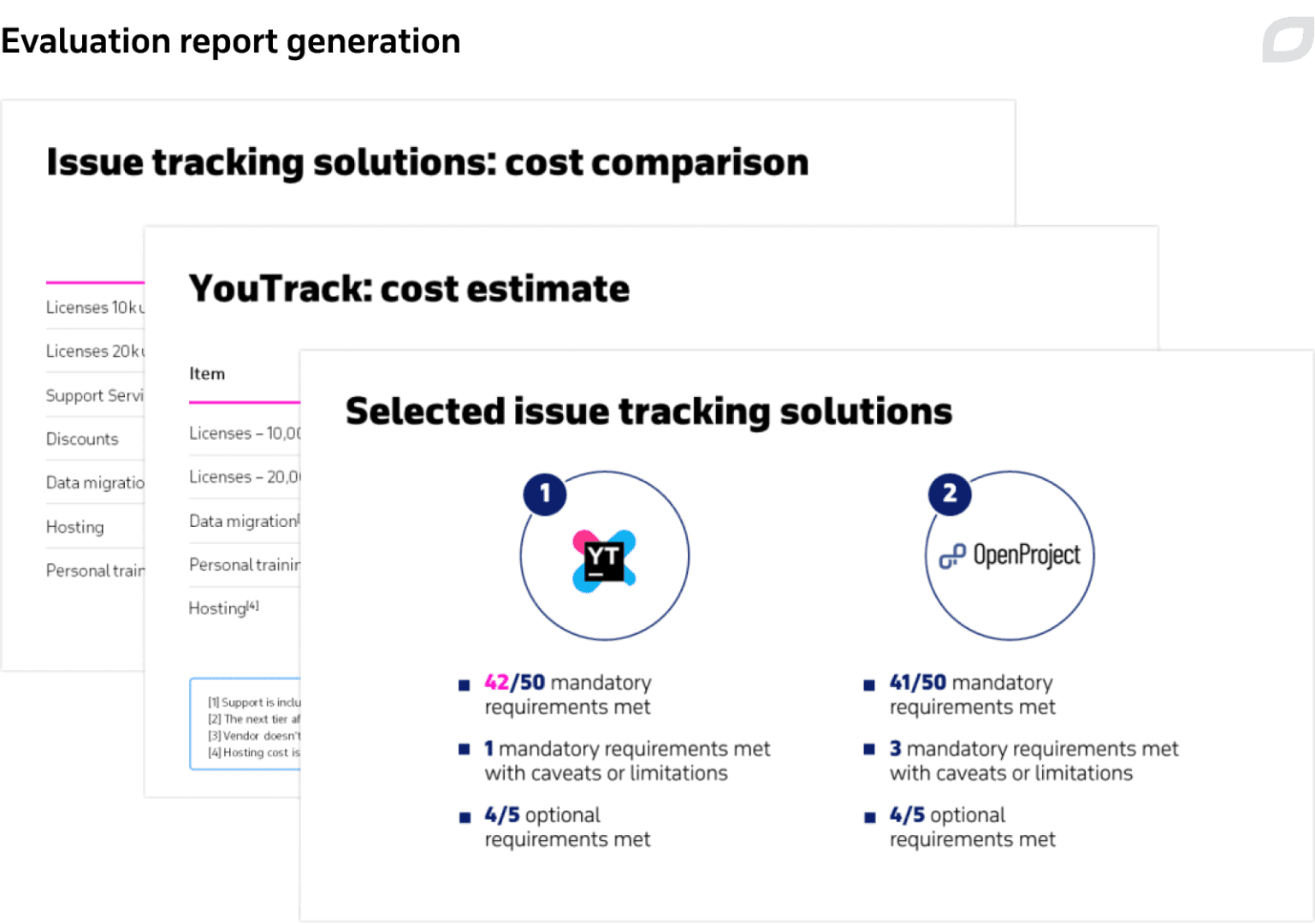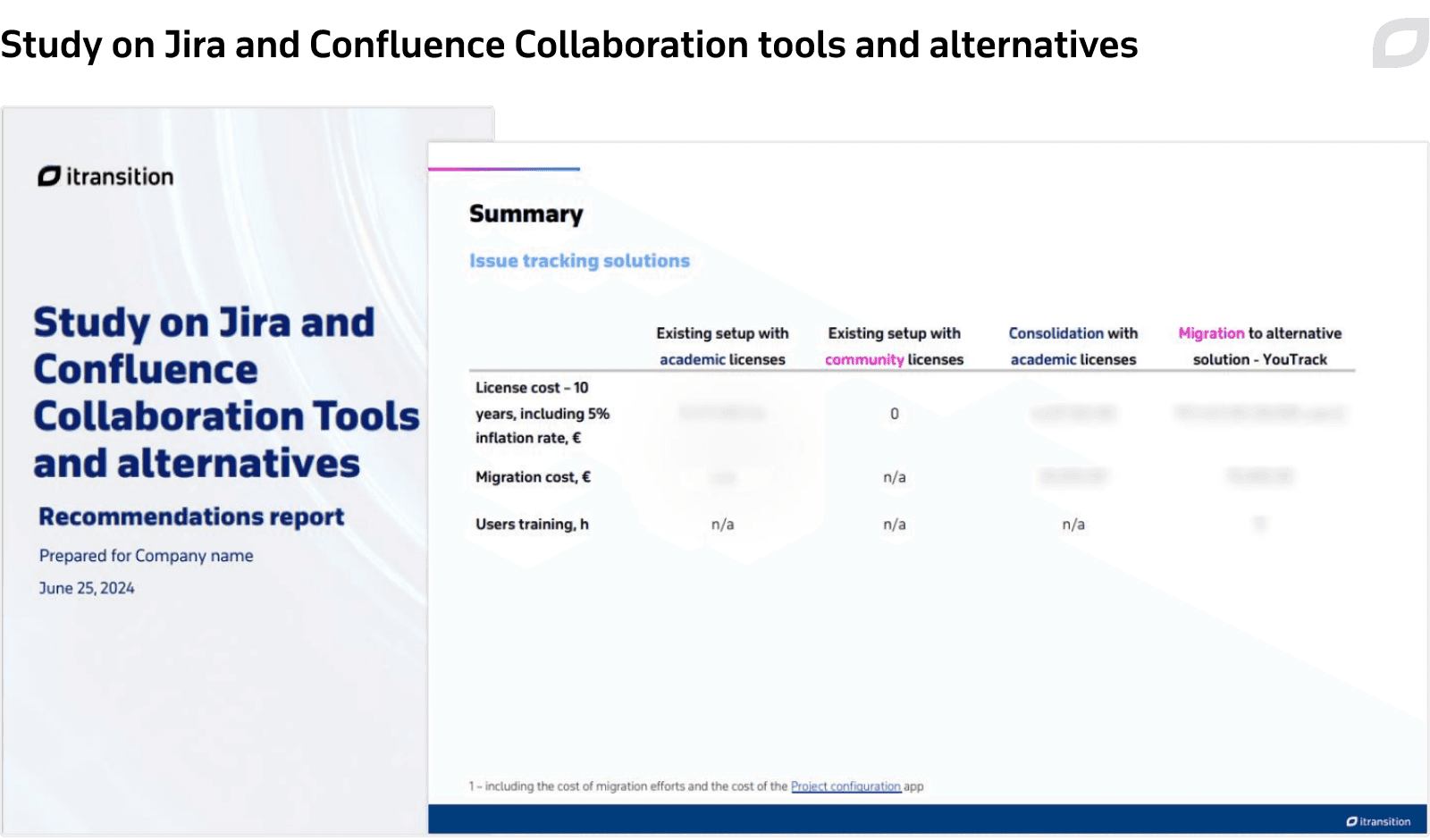
Collaboration tools cost optimization & consulting
Itransition helped the customer save $1+ m in annual Atlassian licensing fees and provided an action plan to reduce their Atlassian TCO in half.
Challenge
The customer is a non-profit center for scientific research operating in 50+ countries. For 10+ years, they have been using Atlassian Confluence and Jira, utilized by 15,000+ distributed users from institutions across 40 countries. Due to another planned significant rise in prices for Atlassian products, the customer faced a 15x yearly cost increase for all Jira instances and an 8x increase for Confluence instances in use.
To avoid the increase in costs, the customer wanted to consider other options and needed a consulting partner to advise them on both the Atlassian products ecosystem and other off-the-shelf collaboration tools on the market. They chose us due to our Gold Atlassian partner status and successful track record in advising clients on Atlassian setup, licensing, and cost optimization. Additionally, our experience matching clients’ business processes with tools and instruments on the market, both as a standalone service and as a part of the discovery phase, helped the customer decide to partner with Itransition.
Solution
From 200+ out-of-the-box alternatives to Jira and Confluence, Itransition first selected and analyzed 30 tools for issue tracking and 20 solutions for content management. After thorough research, we narrowed down the alternatives to 4 products for issue tracking and 3 tools for content management. Our team compiled an evaluation report with the pros and cons, as well as the estimated costs of each option.
Itransition created a rating system to compare the tools’ requirements coverage, migration complexity, community license availability, and other important factors. Having rated the products, we selected the two best scenarios for the customer to implement. We also investigated the available Atlassian pricing opportunities and delivered a recommendation report on reducing the TCO of the Atlassian issue tracking and content management tools.
Process
Initiation
The project started with gathering initial information about the company and its processes. During the kick-off meetings, our team studied the customer’s processes and practices, collecting the customer’s feedback, requirements, and expectations. We interviewed the customer’s procurement team to collect the details about the existing Atlassian billing terms and conducted technical interview sessions to uncover details about the existing Jira and Confluence configuration and customization.
By the end of the initiation stage, Itransition had acquired high-level and specific requirements lists for the solutions. The high-level requirements were aimed at cutting off completely unsuitable solutions and included:
- Support of an on-premises self-hosted version
- Enterprise scale to cover 15,000+ users
- Integration with SSO and LDAP
- License costs close to the customer’s current ones
- Extensive knowledge base and community support
- Intuitive UI and easy learning
The customer provided specific requirements for both project management and content management products, including mandatory and optional features. We used these requirements for the selected products’ comparison:
| Shall requirements | Should requirements | |
|---|---|---|
| Issue tracking solutions | 50 | 5 |
| Content management solutions | 30 | 45 |
Research
The research stage included two rounds of review, each one ending with checkpoint meetings with the customer to assess the team’s progress and ask the arising questions.
During the first review round, we picked 30 solutions for issue tracking and 20 solutions for content management that fit the customer’s high-level requirements.
In the second review round, we studied these solutions against the mandatory and optional requirements to shortlist four alternatives for issue tracking and three for content management. Then, we conducted deep research, aligning the functionality of the selected products with the customer’s specific requirements.
| Shall requirements met (out of 50) |
Should requirements met (out of 5) |
|
|---|---|---|
| YouTrack | 42 | 4 |
| Jira | 43 | 4 |
| OpenProject | 41 | 4 |
| Redmine | 39 | 4 |
| GitLab | 40 | 5 |
We compared content management solutions in the same way:
| Shall requirements met (out of 30) |
Should requirements met (out of 45) |
|
|---|---|---|
| Confluence | 30 | 44 |
| XWiki | 29 | 36 |
| BlueSpice MediaWiki | 27 | 22 |
| DocuWiki | 20 | 24 |
Evaluation
Our consultants created a comparison matrix where each of the tools selected for evaluation got a list of pros and cons, as well as the rating based on the following criteria:
- Capability to meet the customer’s Shall and Should requirements
- Discounts and community licenses
- Complexity of migration from Jira and Confluence
- End-user training complexity
- UI/UX
- License costs
- Extensibility
- Support offerings
Each criterion was then broken down into weighted areas and given a 1/ 0.75/ 0.5/ 0.25 or 0 rating. Here is an example:
| Category | Rating breakdown |
|---|---|
| Migration from Confluence and Jira services |
1 - migration is not needed 0.5 - vendor assists with migration 0.25 - vendor doesn’t assist with migration, but the migration documentation and migration are available 0 - no documentation and migration tools |
The summarized ratings of products showed how well the solutions correspond to the set requirements. Finally, we presented the extended evaluation report, the products’ demo, and comparison results.

Recommendations
Taking into account the gathered data, research results, and communications with the customer, Itransition offered the customer two options.
Option 1: stay with Atlassian
Since the customer is a non-profit organization, striving to better the world, the best option is to apply for a free Atlassian Data Center Community subscription.
The Atlassian Community license offers charitable non-profit organizations self-managed Data Center licensing at zero cost and a 75% discount on cloud subscriptions. Eligible organizations are non-commercial, non-government, non-political, non-academic, and those without religious affiliation. To obtain the Community license, organizations submit application forms with answers to basic questions about their activity and values. For example, they should avoid causing harm to the environment, violating human rights and public safety. Also, they should be affiliated with political parties or campaigns. Once submitted, applications undergo vetting against Atlassian’s Community guidelines by Atlassian’s partner Percent, a leading non-profit technology platform.
If the customer continues using Atlassian, data migration and user training aren’t necessary, and they can keep the existing Atlassian setup for significant cost savings. Jira instances consolidation can also cut annual admin Jira and Confluence TCO.
Option 2: switch to alternative solutions
Another pathway is migrating to YouTrack to replace Jira for issue-tracking and to switch from Confluence to XWiki for content management. To describe this option, we provided detailed product descriptions and demos, installation instructions, a step-by-step migration plan, and roundabouts for implementing mandatory features that aren’t supported out of the box.
Additionally, we calculated migration costs and timelines, 10-year TCO (counting in a 5% inflation rate and loyalty discounts), and provided a list of technology partners to support product adoption.

Results
Itransition performed a 360-degree alternative product evaluation of a switch from Jira and Confluence and demonstrated how the customer can cut their Atlassian bill.
- The customer uses a free Atlassian Community license, saving $1m+ in annual subscription costs.
- The annual Jira and Confluence TCO costs are cut by half thanks to Itransition’s recommendations.

Services
Atlassian Gold Solution Partner
Get professional assistance from an Atlassian platform partner to set up, deploy & customize Atlassian apps in the cloud or on-premises in line with your needs.

Case study
Atlassian consulting & license management for a climate solutions provider
Learn how we optimized the company’s Jira and JSM solutions and performed license management, helping it increase request processing capacity and reduce costs.

Case study
Atlassian-based project management system for banking
Learn how Itransition implemented an efficient Atlassian-based project management system and knowledge base for a European bank.

Case study
Jira implementation for Nakamoto & Associates
Learn how Itransition helped the Oracle Cloud consultant with Jira implementation to improve their agile software development project management.

Case study
Atlassian migration for IATA
Find out how Itransition implemented Jira Service Desk Cloud and migrated legacy data to it for IATA, an aerospace trade association.

Case study
Atlassian-based DevOps transformation
Learn how Itransition helped a customer from the airline industry with DevOps transformation and team collaboration based on Atlassian products.

Case study
Occupational safety incident management software
Find out how Itransition delivered a Jira-based incident management system for an oil and gas company.

Case study
Atlassian consulting for a UK software development provider
Learn how Itransition’s Atlassian experts helped the customer optimize their software development by customizing their Jira and Confluence solutions.